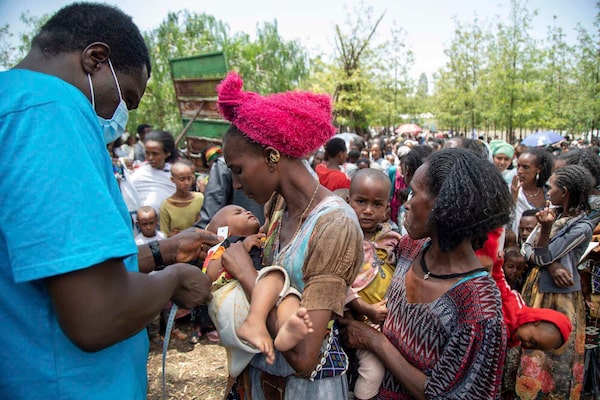
Prime Minister Abiy Ahmed's attack on Tigray apparently was motivated by his desire to eliminate potential rivals to his dominance of Ethiopia, a federation of 10 semi-autonomous regions.Christine Nesbitt/The Associated Press
Robert Rotberg is the founding director of the Harvard Kennedy School’s program on intrastate conflict, a former senior fellow at CIGI and president emeritus of the World Peace Foundation. His latest book is Things Come Together: Africans Achieving Greatness.
Do nations have a right to starve their own citizens? Prime Minister Abiy Ahmed of Ethiopia acts as if he believes so.
His government’s policies are preventing one million or more hungry inhabitants of Tigray, his country’s northernmost region, from receiving convoys of food from relief organizations and the United Nations. Mr. Abiy has also blocked Tigray from receiving medical supplies, fuel and anything that would mitigate suffering. According to the United Nations Office for the Coordination of Humanitarian Affairs, 400,000 people are prone to famine in Tigray. Moreover, pregnant and lactating women suffer from acute malnutrition and prices for scarce basic goods are soaring.
This tragedy should trigger global action under the Responsibility to Protect (R2P) norm articulated in Canada early in this century and adopted as a norm by the UN General Assembly in 2005. According to R2P, and fundamental humanitarian principles, the leading powers, the African Union and the moral authority of the UN should be able to shame Mr. Abiy into feeding his own people. But Mr. Abiy is thumbing his nose at the UN and recently expelled seven key UN staffers. He has also refused to meet with Samantha Power, administrator of the US Agency for International Development.
Blocking trucks with food from crossing into Tigray is only Mr. Abiy’s latest outrage. Nearly a year ago, his troops invaded Tigray to prevent its regional government from defying his control of the country. Massacres followed. At least 50,000 Tigrayans lost their lives in the slaughter. Hundreds of women and girls have been raped and abused, according to an Amnesty report. Tens of thousands fled across the nearby border into hastily erected refugee camps in Sudan. Many more were internally displaced within Tigray – previously a peaceful, prosperous part of Ethiopia with about eight million inhabitants.
Many months later, Tigrayan militias regrouped, defeated the Ethiopian army in battles within Tigray and even crossed provincial borders into the neighbouring Afar and Amhara regions. Since July, Tigray has been free, but hungry. Mr. Abiy, more than ever, wants to keep the Tigrayans isolated. So he uses food denial as his main weapon. Warfare may resume later this month, when rains cease.
Mr. Abiy’s attack on Tigray apparently was motivated by his desire to eliminate potential rivals to his dominance of Ethiopia, a federation of 10 semi-autonomous regions. Tigray only holds 6 per cent of the country’s 115 million people, so Mr. Abiy envisaged a quick conquest, a stirring put down of the presumptuous Tigrayans and a validation of his own leadership of a country that he had inherited from Tigrayan rule.
Tigrayan rule began after Meles Zenawi and his Ethiopian People’s Revolutionary Democratic Front (Abiy was one of Mr. Meles’s guerrillas) forcibly took Ethiopia back from an oppressive Marxist military machine known as the Derg. Mr. Meles, a Tigrayan, was tightfisted and ran a quasi-democracy with rigged elections. After Mr. Meles died in 2012, the Tigrayans who controlled the government appointed a southerner as Prime Minister but continued to rule behind the throne. Protests by Oromo, 34 per cent of Ethiopia’s population, led the Tigrayans to transfer power to Mr. Abiy, an Oromo, in 2018, assuming that he would honour Tigrayan hegemony.
But last year, after winning the Nobel Peace Prize in 2019, Mr. Abiy demonstrated who was boss. Having won the Nobel for freeing political prisoners and the press, and ending a decade-long diplomatic standoff with despotic neighbouring Eritrea, he invited the Eritreans to help his assault. (The country had its own scores to settle given the Tigrayans’ opposition to its leader.) Eritreans proceeded to destroy camps within Tigray containing Eritrean refugees, and also pillaged and raped alongside Ethiopians.
Mr. Abiy and his followers have also cut the Internet and prevented local and foreign observers from entering Tigray. For many weeks the extent of Ethiopia’s devastation of its own people was only partly known. Collateral damage included the destruction of crops waiting to be harvested, grain stores, animal herds and most commercial operations in one of Ethiopia’s most tourist-visited provinces.
Now, with winter closing in, its inhabitants are further imperiled. No one knows exactly how many Tigrayans will needlessly die in the next few months, but their deaths will sully Ethiopia and underscore global inaction. This is precisely the time for world order to give meaning to R2P. If not now, when?
Keep your Opinions sharp and informed. Get the Opinion newsletter. Sign up today.